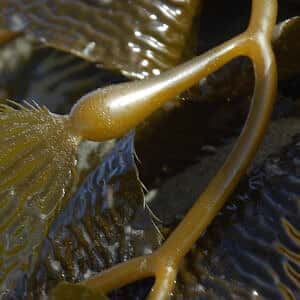
Thyroid dysfunction is common, so common, in fact, that Synthroid is the most prescribed drug in the country. That is a synthetic thyroid hormone, levothyroxine. But while many people take Synthroid or another form of levothyroxine, many others would prefer a natural approach. Should they take a kelp supplement?
Is a Kelp Supplement the Answer?
Q. When my internist noted a low-normal thyroid value, he suggested a thyroid supplement. I suspected I had an iodine deficiency from years on a low-salt diet. I proposed a trial of sea kelp and he agreed. Two 100 mg tablets a day brought the thyroid value up to normal and warmed my cold toes. I also noted my foot fungus receded 90 percent.
A. Using iodine to treat an underactive thyroid gland is controversial. Very few Americans get too little iodine. Your years of avoiding iodized salt may have resulted in an inadequate iodine intake for you, though.
Kelp Supplement Could Make Thyroid Problem Worse:
In a case report, a woman who used kelp as an iodine supplement aggravated her thyroid disease. German researchers noted that this woman developed an overactive thyroid after consuming tea containing kelp (Journal of General Internal Medicine, June 2006). The following details have some doctorspeak, but is worth wading through as a cautionary tale:
“We report a case of iodine-induced hyperthyroidism due to the ingestion of a kelp-containing tea. A 39-year-old woman with multinodular goiter presented with typical signs of hyperthyroidism…including tachycardia (100 beats/min), palpitations, tremor, nervousness, insomnia, fatigue, increased sweating, diarrhea, secondary amenorrhoea, and weight loss. Laboratory analysis revealed increased levels of fT3 and fT4 as well as a suppressed TSH concentration, anti-thyroid antibodies remained negative…
“Considering the average iodine content of kelp of 1,500 to 2,500 μg/g, our patient was taking an estimated 580 to 990 μg iodine daily, i.e., 3.8 to 6.6 times the recommended daily allowance of 150 μg. For comparison, in the United States the estimated average iodine intake of men and women aged 25 to 30 years is 410 and 260 μg/day, respectively. In the literature, several cases of iodine-induced hyperthyroidism after consumption of seaweed have been described, this occurred mainly while taking kelp tablets…
“In our patient, hyperthyroidism did not resolve spontaneously following discontinuation of the kelp-containing tea,…but required antithyroid drug therapy.”
Hyperthyroidism due to Kelp Supplement:
Hyperthyroidism is a serious condition that can be challenging to treat. Here is a more recent case report of hyperthyroidism triggered by kelp. It was published in BMJ Case Reports (Oct., 2014):
“Complementary medications and herbal medicine for weight loss have become very popular. We report a case of thyroid dysfunction following the ingestion of a kelp-containing marketed diet in a 45-year-old woman with no previous thyroid disease. Signs of hyperthyroidism occurred shortly after a kelp-containing diet. Hyperthyroidism lasted 2 months and was followed by an over hypothyroidism…
“After 3 months of levothyroxine substitutive therapy, normal thyroid function was recovered after levothyroxine discontinuation. This clinical history is compatible with a case of iodine-induced thyrotoxicosis followed by prolonged block of the sodium-iodide symporter activity as a consequence of excessive iodine consumption from kelp. Consumers of marketed diets containing kelp of other iodine-rich ingredients should be advised of the risk to develop a thyroid dysfunction also in the absence of underlying thyroid disease.”
Contrast CT Scans Can Also Pose a Hyperthyroid Risk
Many physicians are quick to warn about dietary supplements. The authors of the first article from the Journal of General Internal Medicine concluded:
“Dietary supplements and herbal remedies are used by an increasing number of patients without prior medical consultation. Therefore, patients with known thyroid disease should be advised to avoid all complementary and alternative medications that contain iodine. Before starting any such supplements, patients with underlying thyroid disorder should check with their physician or pharmacist.”
What many physicians (and some radiologists) may not realize is that when they order a CT scan with contrast or cardiac catheterization, they could also trigger hyperthyroidism. That’s because the contrast material often contains iodide. Here is just such a case that was reported on our website along with scientific documentation of the link to hyperthyroidism.
The People’s Pharmacy Bottom Line:
We’re glad you worked with your doctor and got good results, but we don’t generally recommend this approach. For one thing it is hard to control the iodine dose with dietary supplements. Some kelp supplement products may contain more iodine than is safe. Too much iodine can trigger hyperthyroidism and that can be a very dangerous situation.
You can learn more about hyperthyroidism, hypothyroidism, thyroid functioning, diagnostic testing and thyroid treatment in our Guide to Thyroid Hormones. In this 25-page downloadable PDF publication you will learn why some people do not do well on levothyroxine (Synthroid) prescriptions and why some people need both T3 and T4 supplementation. You will also learn why taking your thyroid supplement at night before bed might be more effective than taking it around breakfast time.
This article was updated on September 10, 2015. The original article on kelp was published August 9, 2009 but we felt that it was important to update you on the latest scientific findings with regard to kelp, iodine and contrast material. Please vote on this article and share your own story or comment below.

